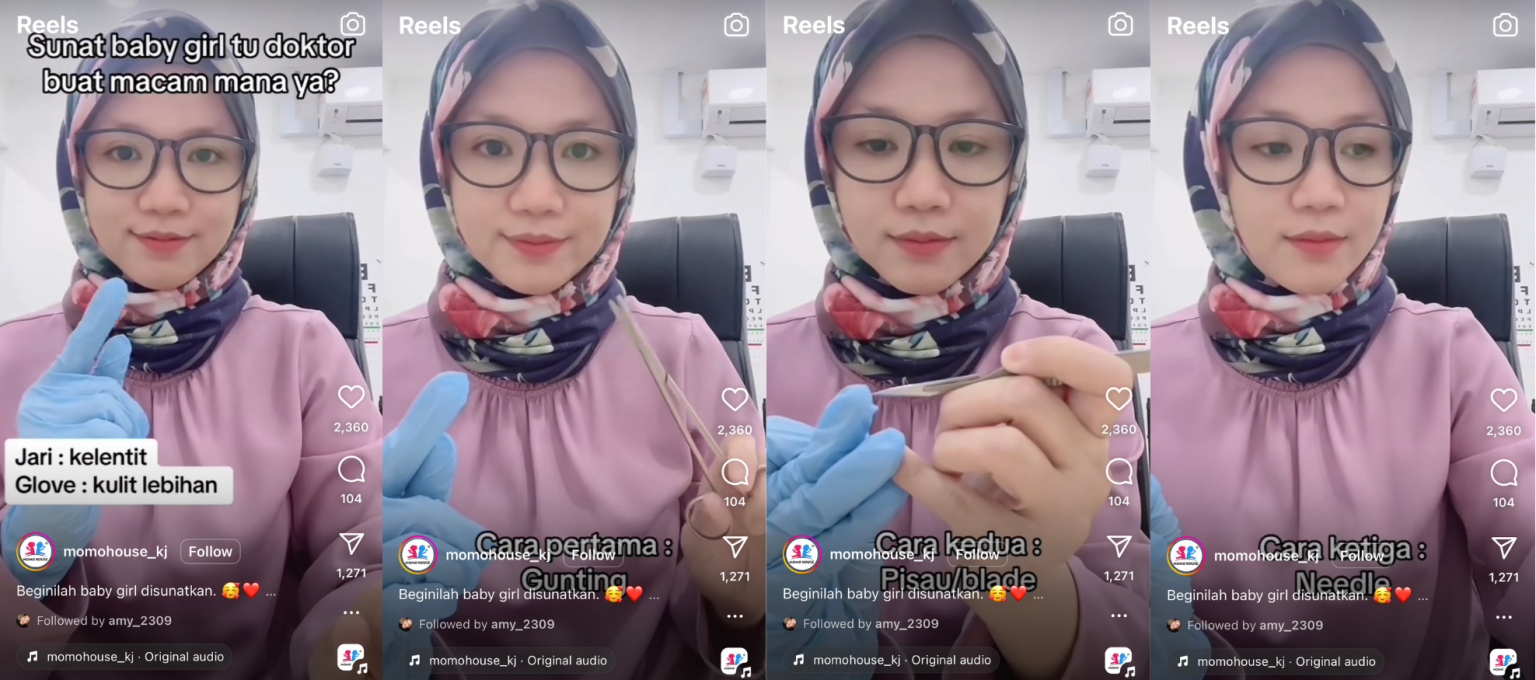The Malaysian Doctors for Women & Children have raised concerns about a viral TikTok video by Klinik Salam Kota Damansara that depicts female genital cutting (FGC) performed on female infants, which was shared by a Malaysian mother and baby online shop called Momo House.
The World Health Organization (WHO) classifies non-medical genital cutting as female genital mutilation/cutting (FGM/C).
However, this video, with over 10,000 TikTok likes and 2,000 Instagram likes, presents FGC as a harmless procedure merely “pricking extra skin”, reinforced by supportive comments from parents who shared their experiences of subjecting their children to FGC.
Our stance is unequivocal: there is no medical justification for any form of FGC. It poses immediate and lifelong physical, sexual, and psychological risks, and the absence of decisive bans by health authorities perpetuates unethical medical conduct.
The Malaysian Doctors for Women & Children unequivocally condemn the practice of FGC, emphasising its lack of medical justification and associated risks. We argue against the procedure based on four main points:
Lack Of Medical Necessity And Misguided Procedures
The video demonstrates a poor understanding of clitoral anatomy, highlighting the risks of performing FGC even in infants. The clitoral hood is closely adherent to the clitoral glans in infants, making it difficult to perform FGC without causing damage.
The procedure risks damaging growing tissue and nerves which are just millimetres underneath the clitoral hood, causing unnecessary pain to infants. FGC on older girls has been reported as extremely painful.
Sexual Desire And Function
The intricate interplay between sexual desire, neurochemical processes in the brain, relationship dynamics, and cultural factors highlights the complexity of human sexuality. The Malaysian FGC may inadvertently hinder sexual arousal, which could subsequently affect sexual desire in adulthood.
We question the ethical justification of subjecting female infants to FGC to potentially control sexual desires in adulthood. A better way is to educate both girls and boys on boundaries and genital autonomy through comprehensive sexuality education.
Cultural And Religious Perspectives
FGC is not a universal Islamic requirement. While some religious authorities opine in favour of FGC, others distance it from mutilation and emphasise consultation with experts. The Grand Mufti of Egypt declared FGC as forbidden in Islam.
A Slippery Slope
“Milder” forms of FGC may lead to more severe practices. Survivors of more extreme forms of FGC reject all types of FGC including these “milder” forms due to the problematic beliefs surrounding them and women.
We encourage health care professionals and the public to read our full statement here to understand the evidence behind our points.
In conclusion, we urge parents and health care professionals to comprehend the realities before considering FGC for female infants. Inflicting pain for a non-beneficial practice is unwarranted.
Malaysia’s CEDAW commitment demands zero tolerance for FGM/C. Rejecting the notion that FGC by health care professionals is harmless, we emphasise that all forms of FGC are harmful.
Let us collectively dispel the dissociative mindset and recognise that FGC, in any form, is harmful and goes against medical ethics. Parents should not be misled by the involvement of health care professionals. It’s time we unite against these harmful practices.
The Malaysian Doctors for Women & Children is a group of Malaysian doctors who are passionate about the academic and scientific discourse of non-medical cultural practices that affect women and children, and of health inequalities experienced by minority groups in Malaysia.
- This is the personal opinion of the writer or publication and does not necessarily represent the views of Ova.












